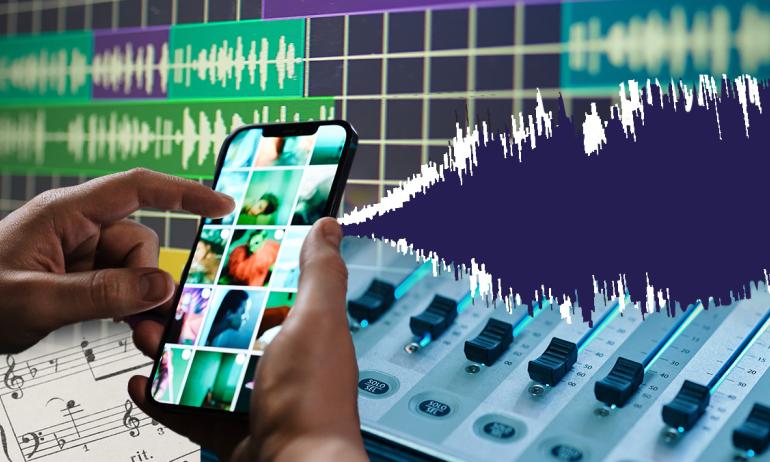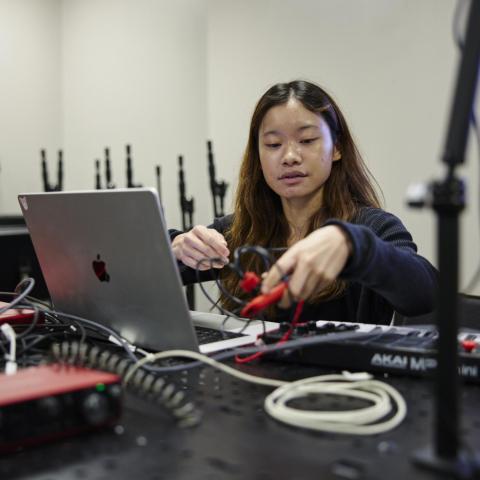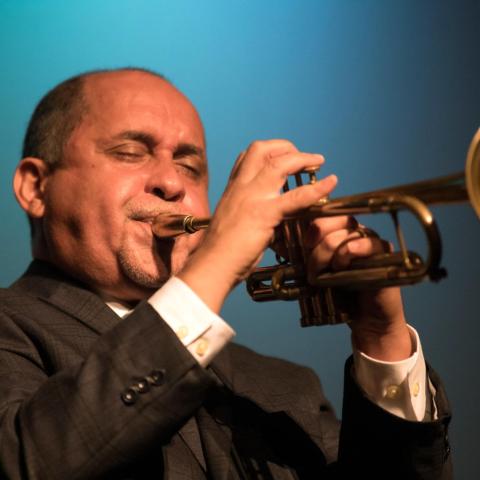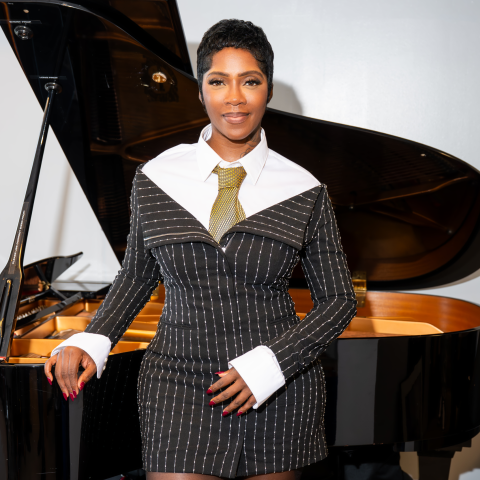Harvard Dual Degree Students Make Music on Both Sides of the River
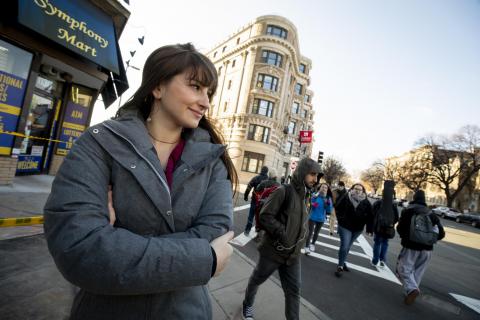
Singer-songwriter Jenny Baker is a student in Berklee's dual degree program with Harvard University.
Photo by Rose Lincoln / Harvard University
Adjusting to university life is a challenge for any entering student. But for a handful of students enrolled in Berklee’s dual degree program with Harvard University, the challenges—and the joys—go double.
“I couldn’t imagine anything more perfect,” says Jenny Baker, a fourth-semester voice student and singer-songwriter who is studying sociology at Harvard. She’s taking advantage of the program to dive deeply into her multiple passions: not only music, but gender studies, social and political inequalities, and criminal justice reform.
“I’m so excited about the chance to tap into Harvard’s resources, and Berklee’s too,” says Baker. “There’s such a different energy at both places.”
The five-year program, launched in 2016, allows students to pursue a Bachelor of Arts (A.B.) at Harvard and a Master of Music (M.M.) or a Master of Arts (M.A.) at Berklee. During their first three years, students pursue a degree in the concentration of their choice at Harvard and take private instruction and ensembles at Berklee. At the end of their third year, students must complete an audition and interview to confirm their readiness for the Berklee master’s program. The fourth year focuses on completing all Harvard requirements, and the fifth year on the requirements for the M.M. or M.A. degree.
This fall, Baker was part of both Berklee’s Mixed Pop Styles ensemble and Harvard’s 21 Colorful Crimson, a group of undergraduates in the class of 2021 who create and perform an eclectic mix of music. “There are a lot more musicians at Harvard than I expected,” she says. Coming over to Berklee for rehearsals and classes allows her to pursue a deep musical education in vocal technique and ensemble performance. She is also interested in other aspects of music: songwriting, music law, and the challenges faced by artists’ managers. Back at Harvard, she’s taking classes on subjects such as mass incarceration, U.S. immigration policy, and feminist political thought.
"I’m interested in doing policy work one day,” Baker says. “But I’m also dedicated to my music.”
Singer-songwriter Avanti Nagral has taken a wide variety of courses at Harvard and Berklee.
Avanti Nagral, another dual degree student and sixth-semester vocalist who is studying psychology and global health at Harvard, is similarly relishing the chance to dig into Harvard’s academic resources on many different subjects. But she’s also been impressed—even amazed—by the caliber of talent and dedication from her fellow students at Berklee.
Nagral is a singer-songwriter whose most recent single, “The Other Side,” draws on her experience of living between two worlds: her hometowns of Boston and Mumbai, and now her neighborhoods of Harvard Square and Back Bay. “I remember sitting and reading a neuroscience textbook while I waited for a private lesson at Berklee,” she says with a laugh. “People didn’t know why I was looking at pictures of a brain. But I’m interested in all of it.”
Nagral and her fellow dual-degree students admit that the logistics of going back and forth can be challenging: “I spend my life on the 1 bus,” Nagral says. But the experiences also enrich each other. For instance, Nagral has used the techniques she’s picked up from her private instruction at Berklee in her work as a peer speaking tutor at Harvard. She helps other students prepare for speeches and presentations, coaching them on stage presence and body language. “I’ll always start with a vocal warm-up,” she says. “I want them to understand that the voice is more than just words.”
Nagral also finds ways to make her Harvard coursework applicable to her music. In a negotiation and conflict management course she took last fall, she tailored some assignments to deal with contractual and legal issues in the music industry. She also submitted (with her professor's permission) an original song for her final project in a gender studies seminar. “My experiences definitely inform each other,” she says. “And my classes at Berklee have given me the vocabulary for some things I was already trying in my own music. It’s been great to have these practical skills—creating lead sheets, for example—and also to be asked good questions, like, ‘What’s your purpose as an artist?’ I don’t always have an answer, but it’s well worth thinking about.”
Eric Tarlin, a fourth-semester saxophonist (and also a member of 21 Colorful Crimson), agrees.
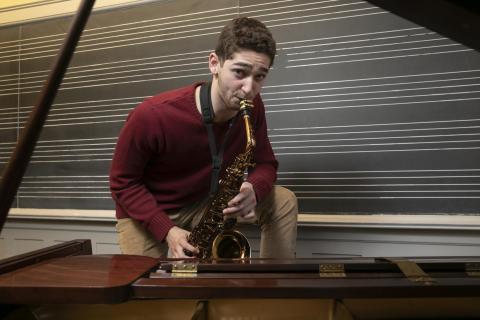
Eric Tarlin is a saxophonist and producer.
“I’m interested in music tech and music performance, but the liberal arts aspect of the program is really important to me,” he says. “I think that foundation is vital to becoming a thinking adult. So I’ve been thrilled to dig into liberal arts classes and music classes at Harvard, and private lessons and ensembles and some other classes at Berklee.”
Although the students all relish the range of opportunities, they admit it can be tough to juggle not only the logistics, but the wildly different approaches to music at both schools.
“There’s a lot more structured classical music at Harvard,” says fourth-semester violinist Emily Spector, who also plays guitar and participates in classical ensembles at Harvard. Tarlin, who plays in Harvard’s jazz band, points to the department’s emphasis in musicology, which he calls “very different” from the broad range of musically focused disciplines at Berklee. But, he says, the two approaches make for a fascinating give-and-take that is shaping him as a student and a musician.
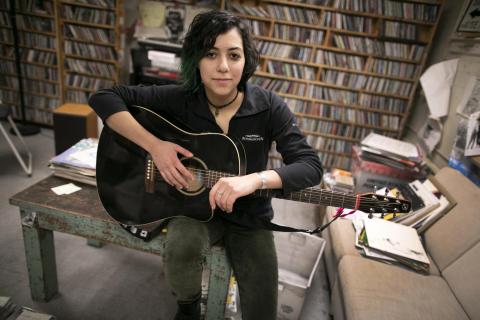
Emily Spector, who plays violin and guitar, also works at Harvard's student radio station, WHRB.
Stephanie Mitchell/Harvard University
Spector agrees. “I was so excited that it launched just in time for me to take it," she says. "I wanted a liberal arts experience, but I also wanted music—and not just classical.” In addition to her violin work, Spector (a voice principal at Berklee) plays guitar and piano, and has taken songwriting classes at both schools. “It’s a nice mix of performance, composition, and the more scholarly work, which I really enjoy,” she says. “There are definitely clashes and challenges. But there are times when it all lines up nicely.”
Spector’s solution to the logistical back-and-forth has been to dig her old bike out of her family’s garage. “It’s the best thing ever,” she says. “I can stuff my books into my guitar case and ride across the river with it on my back. I can be totally independent, do my own thing.”
For Spector and her fellow students, the dual degree program is a chance to do just that: pursue their music and their other passions, while enjoying the resources and the vibrant communities of both places.
“The biggest value of any institution is the people,” says Spector. “I feel lucky to be surrounded by so many amazing people at both places. It’s really helping me grow as a student and a performer.”

